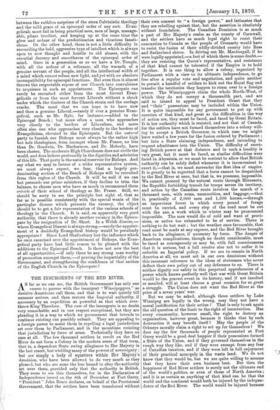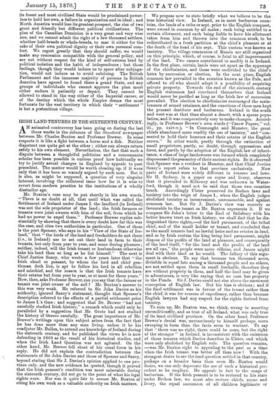THE INSURGENTS OF THE RED RIVER.
AS far as we can see, the British Government has only one course to pursue with the insurgent "Winnipeggers," as derisive Americans call them, and that is to wait quietly till summer arrives, and then restore the Imperial authority, if necessary by an expedition as powerful as that which over- threw King Theodore. The case of the insurgents is no doubt very remarkable, and in one respect exceptional, but they are pleading it in a way to which no government that intends to continue existing can possibly submit. They are appealing to a foreign power to assist them in repelling a legal jurisdiction set over them by Parliament, and in the meantime resisting that jurisdiction by force of arms. Technically they have no case at all. The few thousand settlers in revolt on the Red River do not form a Colony in the modern sense of that term, that is, a dependent State owing allegiance to Her Majesty in the last resort, but wielding many of the powers of sovereignty ; but are simply a body of squatters within Her Majesty's dominion, who have been allowed to do very much as they pleased, but who are none the less bound to obey the authority set over them, provided only that the authority is British. They seem to see this themselves, for in the Declaration of Independence issued on the 8th of December at Fort Garry, "President" John Bruce declares, on behalf of the Provisional Government, that the settlers have been transferred without their own consent to " a foreign power," and intimates that they are rebelling against that, but the assertion is absolutely without foundation. The Canadian Dominion is as much a part of Her Majesty's realm as the county of Cornwall, and the settlers have as much legal right to resist their annexation to Canada as the people of Cromarty would have to resist the fusion of their oddly-divided county into Ross and Sutherland shires. In driving out Mr. Macdougall, if he were legally appointed,—a fact of which there is some doubt,— they are resisting the Queen's representative, and resistance of that kind cannot be tolerated if the Empire is to hold together. It is one thing to allow a colony, organized by Parliament with a view to its ultimate independence, to go free after a regular vote and negotiation, and quite another to permit a handful of settlers to kick out the Royal flag and transfer the territories they happen to roam over to a foreign power. The Winnipeggers claim the whole North-West, of which they do not occupy a thousandth part, and are said to intend to appeal to President Grant that they and "their" possessions may be included within the Union. It is quite impossible for any government to put up with coercion of that kind, and great as the difficulties in the way of action are, they must be faced, and faced by Great Britain. It is her authority which is resisted, and not that of Canada, for the settlers have not formed themselves into a colony will- ing to accept a British Governor, in which case we might have waited a few years for the fusion ordered by Parliament ; but into a State claiming independence, and intending to request admittance into the Union. The difficulty of exert- ing British power at that distance and in such a locality is very great, but it must be faced, as similar difficulties were faced in Abyssinia, or we must be content to allow that British authority can be safely defied whenever it is inconvenient to exert it, that is, we must surrender the first idea of empire. It is greatly to be regretted that a force cannot be despatched to the Red River at once, but that is, we presume, impossible. We cannot proceed by the natural route through Minnesota, the Republic forbidding transit for troops across its territory, and action by the Canadian route involves the march of a thousand men, with arms, ammunition, and baggage,—that is, practically of 2,000 men and 1,500 horses,—through an impervious forest in which every pound of forage must be carried, and every step of the road must be cut with the axe, a work which in winter may be pronounced impossible. The men would die of cold and want of provi- sions, or arrive too exhausted to be of service. There is nothing to do but wait ; but the weather once favourable, that road must be made at any expense, and the Red River brought back to its allegiance, if necessary by force. The danger of American complications, though no doubt considerable, must be faced as courageously as may be, with full consciousness that it is serious, but a full resolve also not to suffer it to enfeeble an Imperial policy. If we are to remain in North America at all, we must act in our own dominions without this incessant reference to the ideas of statesmen who never deflect their own policy out of any deference to us. There is neither dignity nor safety in this perpetual apprehension of a power which knows perfectly well that war with Great Britain would be the gravest event in its history, and if not insulted or assailed, will at least choose a great occasion for so great a struggle. The Union does not want the Red River at the price of a seven years' war. But we may be asked, although these settlers by Lake Winnipeg are legally in the wrong, may they not have a moral justification for their action ? That is only to ask again the old question of the limit to the right of insurrection. Has every community, however small, the right to destroy an organization, however great, because it thinks that by such destruction it may benefit itself ? May the people of the Orkneys morally claim a right to set up for themselves ? We dare say the few thousands of people represented at Fort Garry would be a good deal happier if their possessions formed a State of the Union, and if they governed themselves in the rough way they like, and if they were exempt from any fear of Canadian taxation, and if they were left in full enjoyment of their practical monopoly in the waste land. We do not know that they would be, but we are quite willing to assume that they know their own business best. But then the happiness of Red River settlers is surely not the ultimate end of the world's politics, or even of those of North America ; and it is as certain as anything of that kind can be that the world and the continent would both be injured by the indepen- dence of the Red River. The world would be injured because
its freest and most civilized State would be proclaimed power- less to hold her own, a failure in organization and in ideal ; and North America would lose its greatest prospect, the rise of two great and friendly but different political civilizations. The plan of the Canadian Dominion is a very great and very wise one, and we cannot admit the right of a few thousand settlers, whether half-breeds or whole-breeds, to mar it either for the sake of their own political dignity or their own personal com- fort. We regret greatly that they should suffer, we would make any concession compatible with the general policy, and are not without respect for the kind of self-esteem bred by political isolation and the habit of independence ; but those feelings, though they would induce us to spare after subjuga- tion, would not induce us to avoid subduing. The British Parliament and the immense majority of persons in British America have agreed to found there a grand State, and any groups of individuals who cannot approve the plan must either endure it patiently or depart. They cannot be allowed to stand in the way either of the Imperial career, or of the destiny which the whole Empire deems the most fortunate for the vast territory in which their " settlement " is but a pretentious village.































 Previous page
Previous page